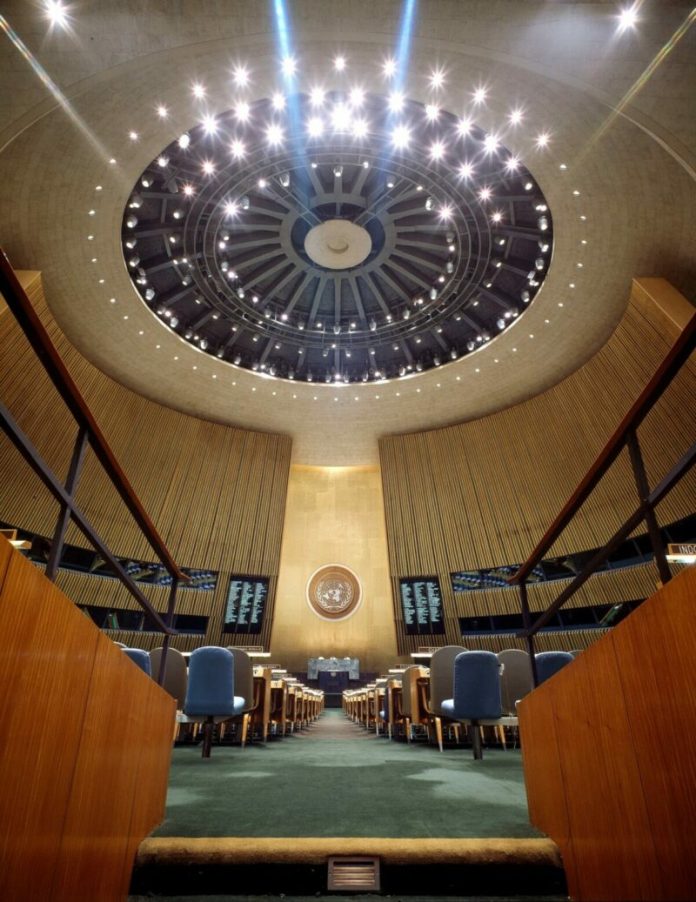UN News: A few days ago, here in New York, world leaders adopted the Pact for the future and milestone document designed to turbocharge the achievement of the sustainable development. How will this pact influence the mission of the UN sexual and Reproductive Health Agency? Would you need to somehow adapt your priorities?
Natalia Kanem: This Pact of the Future and the companion documents that look at our digital future and the Pact for future generations as our Secretary General, Antonio Guterres, has expressed it, is a moment of solidarity where the world is coming together to say that humanity needs rescuing by the Sustainable Development Goals. So, of course, working on sexual and reproductive health, UNFPA is very concerned about the attitudes and the interests and the aspirations of young people. And I’m really very proud that we were able to contribute to young people having meaningful contributions that actually influence the language in that Pact.
For the questions of sexual and reproductive health… It affects an individual. It’s about their rights. It’s about their choices. But it’s also an expression of how humanity is going to adjust to a time where we have more young people than we’ve ever had, and we have more people in the older generation simultaneously than we’ve ever had. So, this is very influential for us. And I think that it will be a moment for UNFPA to help the 150 plus countries where we serve to translate what that hope and that determination that comes out of the Pact means. In every village, every city, wherever an adolescent girl finds herself, we’re going to help to translate that into reality.
UN News: 150 countries, lots of tasks that you have. The work of UNFPA requires sustainable financing for that. Yet in the past there have been instances when some countries abruptly reduced contributions. What is the situation now? Are you optimistic about UNFPA’s budgetary future?
Natalia Kanem: I am. And I’ll tell you why. I believe that women and girls are on the record as defending their freedoms and their rights and choices. Also, my colleagues in UNFPA are very careful in our work to take the lead from what the local perspectives are. We work in full partnership with governments of course. But also with the midwives who are the backbone of what we do. They know their communities, they understand the culture, and they also understand the changes that are needed for things like early marriage before the age of 18 to be a thing of the past, there has to be a community resolve.
UNFPA has been fortunate to have strong support from our Member States, and we’re grateful for this. There should not be any controversy around preparing young people to face the future, to understand what rights and choices in their fertility decisions, for example, mean. For an end to gender-based violence, we have to have discussions about peace. And also in a setting where there’s so much humanitarian need, UNFPA is leading in helping the understanding that women and girls and people on the move have to be protected. This should not be swept under the rug. The dignity of the human being should not be violated because of something like gender. And we do proudly assert that UNFPA has been very strong on accountability in terms of our being able to manage the resources that were given wisely and to bring the results to show. So yes, I think I’m very optimistic because it’s going to take a lot to turn this world right side up. And the leadership of women and girls, which actually starts with respecting an adolescent and her right to learn, her right to aspire, to fulfill her potential, that leadership is going to make a big difference in the years to come.
UN News: So, you feel in your work the support of the countries and the sponsors who facilitate your work?
Natalia Kanem: I quietly say that UNFPA actually has more resources than we ever had. We’ve grown our agency, we’ve partnered well with other UN agencies because we see ourselves as part of a network that has to be well coordinated if we’re going to achieve that major impact. But I have to be honest to say that the need is outstripping what we have in our budgets. I’m very concerned about core resources. These are the flexible annual resources that give me a chance to pivot when something like COVID comes up, when something like the humanitarian tragedies that we’re witnessing come up. We have to be ready. We have to be pre-positioned. And it’s resources that allow us to deliver for people on the ground.
As I advocate for resources, specifically in the humanitarian sphere, UNFPA is a leader among the United Nations and in the humanitarian sector in providing local resources through women’s organizations and where we can through youth organizations. We actually deliver 40 per cent of what we do at the local level, which is really important. They know what will make the biggest difference.
UN News: Speaking of resources, with human resources being one of the most important ones, with so many new crises globally, UNFPA, as you said, in some countries has become a leading humanitarian force. And there are new challenges that your staff is facing, sometimes becoming de facto humanitarian workers saving lives. How have the UNFPA staff adapted to the work in conflict zones? In Sudan, for example?
Natalia Kanem: The UNFPA staff are among the most dedicated in the world. These are people who are hard at work right now and every day, and the vision that carries us is a world that’s going to be better for a ten-year-old girl to be able to fulfill her potential. And we’ve paid attention as Secretary-General and others have talked about the humanitarian nexus, that peace is a part of conquering the strife. And also, that development is the answer. Sometimes when conflict arises, it’s squabbling over resources, if you will. And regardless of what the issues are, sadly, it’s going to be a woman and a girl fleeing for their lives whose future is interrupted.
As for our staff, we were there before crisis in Sudan. We had worked there many years before the latest situation broke out and we’re often there afterwards in order to help the situation repair. So, during the conflict situation it is very important to have people on the ground who will speak up for the rights of women and girls. And that’s exactly the expectation that we have of our staff.
Why should a woman die during pregnancy and childbirth for lack of resources? We mobilize. We are embedded in the ground. And I have to say, because we’re talking about Sudan, the issues of hunger, all of these dots are connected to the fate of a girl. And rape, sadly, has been very predominant as a feature of that conflict. So, we need everyone to vociferously object, to stand up for rights and to make sure that impunity is not part of the picture when such things happen.
UN News: Dr. Kanem, is Sudan the most worrying crisis you face as an agency trying to provide essential services to women and children around the world? Is it’s already too late to avoid more deaths of women and young children there and in other points of conflict?
Natalia Kanem: It’s never too late. It’s never too late and we all have to garner our resources and our attention. Sudan is of great concern because, as our attention swivels to Ukraine and Gaza and other places, there is an element of a forgotten crisis which already has affected over ten million people. There’s so much displacement internally. And then next-door countries like Chad already battling scarce resources have had to step up. So, I believe that part of the answer is making sure that women are at the peace table. I believe that part of the answer is making sure that women can speak, and this is all around the world.
When we serve in places like Sudan, for example, a safe house, a safe space can make a difference. In Sudan itself, we’ve been able to keep our operations going so that these safe spaces provide a respite for women who are weary of conflict and who are asking for action at the diplomatic level, is where this crisis is going to be resolved. War is not going to solve those issues.
So, with the United Nations, with the African Union, UNFPA is part of the process that provides a measure of dignity for women who are suffering indignities and giving them a chance to live another day. And I hope for that image of a bright future for this girl. She may feel broken today, she may have been sexually assaulted, she may be hungry, she may be scared. It is our responsibility to speak up for her. She has the same equal rights like anyone else on the planet. And I think with the right support and with the right impetus, we will be able to conquer the scourge in Sudan and elsewhere.
UN News: What would be your message to those girls, to all those to whom UNFPA offers help and assistance as well as to the frontline staff who work for UNFPA for the future?
Natalia Kanem: For my staff and for humanitarian staff in general around the world: I thank you! Because you’re devoted, you’re serious and you are noble in your intentions. Whatever support we can provide to back you, we’re doing that. And I also want you to look after your own mental health. Take your breaks when they’re offered and look after yourself.
But for the people whom we serve. And for that girl in particular. I want you to know that we’re behind you, that we believe that you’re going to make a difference, that your fate is bound up with everyone else’s, and we’re going to defend your human rights and also your ability to choose what you want to do next. As an adolescent, the world should be full of choices for you. And that’s the world we want. Where you can finish your education, where you will choose when, whether with whom to marry and have children, if that’s your desire, but where your inner light is going to be able to shine for all to see. So, I wish you well, and certainly UNFPA will do its part to make that path a little smoother for you.
Source of original article: United Nations (news.un.org). Photo credit: UN. The content of this article does not necessarily reflect the views or opinion of Global Diaspora News (www.globaldiasporanews.com).
To submit your press release: (https://www.globaldiasporanews.com/pr).
To advertise on Global Diaspora News: (www.globaldiasporanews.com/ads).
Sign up to Global Diaspora News newsletter (https://www.globaldiasporanews.com/newsletter/) to start receiving updates and opportunities directly in your email inbox for free.
































